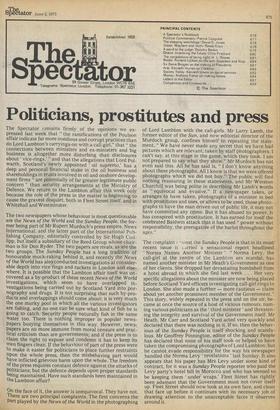Politicians, prostitutes and press
The Spectator lenlains firmly of the opinions we expressed last week that " the ramifications of the Poulson affair indicate far more insidious and corrupt practices than do Lord Lambton's carryings-on with a call-girl," that " the connections between ministers and ex-ministers and big business is altogether more disturbing than disclosures about vice-rings,'" and that the allegations that Lord Polwarth, Scotland's newly appointed oil supremo,' has a deep and personal financial stake in the oil business and shareholdings in trusts involved in oil and onshore development firms" are potentially of far greater legitimate public concern " than security arrangements at the Ministry of Defence. We return to the Lambton affair this week only because the role of the press in the matter is beginning to cause the gravest disquiet, both in Fleet Street itself, and in Whitehall and Westminster.
The two newspapers whose behaviour is most questionable are the News of the World and the Sunday People, the former being part of Mr Rupert Murdoch's press empire, News International, and the latter part of the International Publishing Company, editorially controlled by Sir Hugh Cudlipp, but itself a subsidiary of the Reed Group whose chairman is Sir Don Ryder. The two papers are rivals, as are the two groups. The Sunday People has a long tradition of honourable muck-raking behind it, and recently the News of the World has also conducted investigation g at considerable depth into vice rings and rackets in London and elsewhere. It is possible that the Lambton affair itself was uncovered as a by-product of these recent News of the World investigations, which seem to have overlapped investigations being carried out by Scotland Yard into pornography and drugs. It is not surprising that such by-products and overlappings should come about: it is very much the one murky pool in which all the various investigators are fishing, and no one can be sure what kind of fish he is going to catch. Security people naturally fish in the same water too. There is nothing improper in popular news
Papers busying themselves in this way. However, news: Papers are no more immune from moral censure and prac
tical criticism than are governments; and if the press is to Claim the right to expose and condemn it has to keep its own fingers clean. If the behaviour of part of the press were to make it easier for politicians to place further restraints Upon the whole press, then the misbehaving part would have inflicted grievous harm upon the whole. The freedom of the press requires constant defence against the attacks of Politicians; but the defence depends upon proper standards being maintained. Have such standards been maintained in the Lambton affair?
On the face of it, the answer is unequivocal. They have not. There are two principal complaints. The first concerns the Part played by the News of the World in the photographing of Lord Lambton with the call-girls. Mr Larry Lamb, the former editor of the Sun, and now editorial director of the Murdoch group, confines himself to repeating the statement, "We have never made any secret that we have had pictures which are relevant, taken by staff photographers. I can't say, at this stage in the game, which they took. I am not prepared to say what they show." Mr Murdoch has not even said this. All he has said is, "I don't know anything about these photographs. All I know is that we were offered photographs which we did not buy." The public will find nothing reassuring in these statements, and Mr Winston Churchill was being polite in describing Mr Lamb's words as "equivocal and evasive." If a newspaper takes, or arranges to have taken, photographs of a minister in bed with prostitutes and uses, or allows to be used, those photographs to have the man driven out of public life, it may not have committed any crime. But it has abused its power. It has conspired with prostitution. It has earned for itself the celebrated Baldwin attack that it has used" power without responsibility, the prerogative of the harlot throughout the ages."
The complaint ,ainst the Sunday People is that in its most recent issue it (cirried a sensational report headlined
'Norma Names Another Minister ': "Norma Levy, the call-girl at the centre of the Lambton sex scandal, has named another minister in Mr Heath's Government as one of her clients. She dropped her devastating bombshell from a hotel abroad to which she fled last week . . . Her very specific allegations about the minister are now being placed before Scotland Yard officers investigating call-girl rings in London. She also made a further — more cautious — claim about yet another prominent member of the Government."
This story, widely repeated in the press and on the air, became at once the source of a host of vicious rumours, naming various politicians as the third minister ' and threatening the integrity and survival of the Government itself. Mr Heath, Mr Carr and Scotland Yard acted very quickly and declared that there was nothing in it. If so, then the behavious of the Sunday People is itself shocking and scandalous. Mr Geoffrey Pinnington, editor of the Sunday People has declared that none of his staff took or helped to have taken the compromising photographs of Lord Lambton; but he cannot evade responsibility for the way his newspaper handled the Norma Levy revelations ' last Sunday. It also 'appears that his paper has Mrs Levy under some kind of contract, for it was a Sunday People reporter who paid the Levy party's hotel bill in Morocco and who has seemed to be keeping them underwraps.' Fleet Street has rightly been adamant that the Government must not cover itself up. Fleet Street should now look at its own face, and clean that face up before it continues with its necessary job of drawing attention to the unacceptable faces it observes around it.


































 Previous page
Previous page